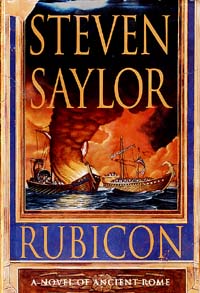Author Literatus
By Clay Smith, Fri., July 2, 1999
|
|
It's important to note that when Saylor says that his books are "a good place to escape to," he's referring to them as an escape for his readers and for himself. In his latest, Rubicon: A Novel of Ancient Rome (St. Martin's, 23.95 hard), there's a plethora of evidence -- the sly and cheeky humor that rears its head every so often -- that Saylor is in on the joke, which is such a crucial ingredient for any work that intends to offer escape to a reader. But Saylor doesn't neglect the weightier elements, the pathos his characters suffer; he depicts (in spades) murder, treachery, character assassination, and the sense of uprootedness that is part and parcel of any treatment of a slaveholding society. Even a brief recitation of Rubicon's plot points is somewhat dizzying: The narrator of the series, Gordianus the Finder, is a former slave who now has a family of his own and is getting too old for the spy business. When Pompey's young cousin Numerius Pompeius comes over to Gordianus' house to tell him he has news for Gordianus' ears alone and then ends up strangled in the courtyard, Pompey decides to "borrow" Gordianus' oafish son-in-law Davus as a bodyguard in the ensuing civil war between Pompey and Caesar until Gordianus unearths the identity of Numerius' murderer. Since Saylor's novels feature such larger-than-life historical figures as Caesar, Pompey, and Cicero, I asked Saylor why he doesn't choose one of them as his narrator.
Steven Saylor: Well, that's just how the series started out. When I wrote the first one, I didn't know I was writing a series. I thought I was writing a "literary novel" (laughs) and I was taken aback a bit when they asked for the next book. And so I thought, "They're offering me a chance to write an ongoing series about the end of the Roman republic, which will be a wonderful experience," so that I created this sort of sleuth-like character simply to have distance from Cicero originally. I didn't want to make Cicero the narrator or the focus of that book. He needed a hired hand. And the character simply evolved. To me, he's almost invisible. I really can't see him and when I do get fan letters saying, "Oh I love the character," I don't quite know what they're talking about because I'm too close.
Austin Chronicle:Do you get a lot of fan mail?
SS: Mostly e-mail these days. I have a Web site, and I put that on the book jacket, so most of it comes in the form of e-mail from around the world.
AC:What sorts of things do they tend to say?
SS: Well, it can be as brief as saying just "love your books!" which is the hardest kind to answer -- what do I say? -- to people who have specific questions about where things are located, where I found a certain source. Some of them are classical scholar types who want to know, "Where did you find this?" and then I have to go look it up, and it takes a lot of time out of me. Other people just want to touch bases. It's really funny -- when I was growing up as a boy, as a reader, I never wanted to meet authors. I never really even wanted to see what they looked like. I wanted them to be distant from me, but maybe the world has changed because now we expect -- you know, the author has to be a public person. And there are people who want contact with you.
AC:And you don't entirely relish that ...
SS: I have never failed to answer a fan letter! I do take it really seriously. The best are the high school students who have clearly been assigned my book, who want crib notes, who say, "Mr. Saylor, I am a huge fan of your work. Could you possibly provide a synopsis of the plot of Catalina's Riddle in 200 words?" I can smell a rat.
AC:How would you describe the reception of the series by classicists?
|
|
SS: It's been very good. I was a little nervous about that because you're dealing with known history and there are experts out there light years beyond me, but I've been invited to speak to many a classical group. I was just at the Classical Association of Atlantic States in Washington, D.C. I've spoken to the National Classical League, which is college and high school instructors, the Junior Classical League, which is high school Latin students, wearing togas, 1,800 of them at their big summer meeting. ... Part of it is that the ivory tower is really under siege in academia and the classicists, they're the Western civilization, dead white male contingent, and, you know, anything that popularizes the ancient world and the classics is something they welcome and they seem to think I'm doing a competent job of it. I mean, some of them really love the books but I don't get a lot of criticism. First, I don't think I make many mistakes.
AC:But you never studied Latin, just Roman history?
SS: I think I told you my Shakespeare quote, didn't I? As Ben Johnson said of Shakespeare, "He knew little Latin and less Greek," and I like to say I am like Shakespeare in this way at least.
AC:But certain phrases pop up; for example at one point in Rubicon, Gordianus has to go to the bathroom during the night and of course that's how we would phrase it, that we have to get up to go to the bathroom, but he says he has to "pass water," and that struck me as the way an ancient Roman might phrase that. So you're obviously putting that in for authenticity's sake.
SS: Well, probably. This question of language in the historical novel of course is something I deal with every day, anachronism and tone and all of that. There are some authors who don't worry about it and who intentionally use anachronisms for comic effect, but that's never been my approach. That's very difficult; that's one of the hardest things because you don't want the jarring word. At the same time, you don't want to be stuffy because it's got to be immediate, you're trying to be as immediate as a modern novel. So that's also a constant challenge. I mean, I sometimes think that anyone who wants to write a historical mystery novel is choosing the hardest possible path because it's a three-ring circus. First of all, you have to write a novel with a beginning, middle, and end, a resolution that resonates. That's a challenge. And then you have to write a mystery novel with an invisible plot that isn't revealed until the end of the book that makes sense, and then you're doing a historical novel which you want to make as authentic and vivid as possible. So it keeps me busy and occupied. Anybody who writes books needs to be engaged in them. And this is a particular thing that I guess engages all of my faculties.










